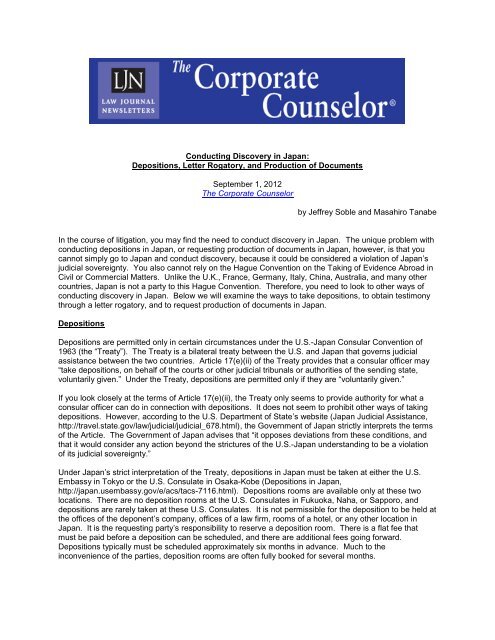Recognizing the Significance of Letters Rogatory in International Legislation
Wiki Article
The Duty of Letters Rogatory in International Law: Secret Insights
Letters rogatory act as an essential instrument in worldwide legislation, helping with cross-border lawful help by permitting territories to formally ask for evidence and activities from one another. Rooted in historical criteria and defined via agreements like the 1970 Hague Convention, these demands are crucial for fostering global participation. Their execution commonly runs into substantial difficulties, including inconsistencies in legal requirements and procedural delays, which can hinder their effectiveness. Understanding the subtleties of this process raises vital concerns regarding global collaboration and the possible reforms required to enhance its reliability. What effects might these difficulties have for future legal procedures?Definition of Letters Rogatory
In the realm of global legislation, letters rogatory work as official demands released by a court in one jurisdiction to look for assistance from a court in an additional territory. Letters rogatory. These requests are particularly substantial in cross-border legal procedures, where the enforcement of a court's order or the gathering of evidence may be impeded due to administrative limitations
The process normally needs the asking for court to verbalize the specific information or action needed from the foreign court, adhering to the legal procedures and conventions developed in between the jurisdictions included. Once released, the letters rogatory are transmitted through polite channels, which may consist of consular offices or consular offices, to make certain that the request is identified and acted on by the foreign court. Generally, letters rogatory exemplify the cooperative framework vital for effective international lawful processes.
Historical Context
Although the practice of letters rogatory has ancient roots, its formalization within the structure of worldwide regulation arised substantially in the 20th century. Historically, such ask for judicial help were made use of in numerous legal practices, including Roman legislation, where they promoted cross-border collaboration in lawful issues. The idea gained renewed interest with the increase of globalization and the enhancing intricacy of global legal communications.The mid-20th century saw the facility of treaties and conventions that sought to standardize the procedure of letters rogatory. Especially, the 1970 Hague Convention on the Taking of Evidence Abroad in Civil or Commercial Issues offered a structured technique, boosting the efficiency of these demands - Letters rogatory. This duration noted a shift from casual setups to a more systematic structure, which addressed the obstacles postured by differing nationwide legal systems
As states came to be much more interdependent, the need for reliable systems to collect evidence across boundaries ended up being evident, strengthening the duty of letters rogatory in facilitating worldwide cooperation. Today, they remain an important tool for acquiring evidence and ensuring that justice transcends national limits, mirroring the progressing nature of global regulation in response to worldwide difficulties.
Process of Issuing Requests
The process of releasing letters rogatory commonly involves numerous critical steps made to ensure that ask for judicial aid are clear, specific, and certified with both international and residential legal criteria. An event seeking aid must prepare an official request that outlines the significant facts of the instance, the alleviation sought, and the details evidence or testament needed. This record needs to be crafted with precision to satisfy the lawful requirements of the territory in which it will certainly be submitted.Following the preparation of the request, it is submitted to the suitable authority, commonly a court or a designated governmental firm. This authority examines the request to ensure it complies with step-by-step norms and legal criteria. When authorized, the demand is transferred to the international jurisdiction via diplomatic channels.
Upon receipt, the foreign court evaluates the request's conformity with its regional regulations and methods (Letters rogatory). If approved, it proceeds to execute the demand, which might involve the issuance of subpoenas or the collection of proof. Throughout this procedure, preserving clear interaction in between the asking for and obtaining territories is important to guarantee successful collaboration and the satisfaction of the request
Obstacles and Limitations
Challenges and constraints often occur in the process of executing letters rogatory, commonly coming from differing legal systems and treatments in between jurisdictions. One substantial barrier is the varying requirements of admissibility for proof, which can cause problems in the acceptance of documents asked for via letters rogatory. Additionally, the absence of uniformity in legal terms and meanings can create misconceptions, complicating communication between courts in different nations.Moreover, delays are typical as a result of governmental processes, as the request might require to go through several layers of lawful authorities before it is satisfied. In some instances, the asked for territory might lack the required resources or determination to coordinate, additionally impeding the procedure. Language barriers likewise contribute to challenges, as accurate translation of lawful papers is vital for making certain that the intended message is shared without distortion.
Last but not least, sovereignty problems may occur, as some states are unwilling to adhere to demands that they regard as infringing upon their lawful freedom. These difficulties highlight the complexities intrinsic in the usage of letters rogatory, necessitating greater harmonization and collaboration amongst worldwide legal systems to improve their efficiency.

Effect On International Cooperation
Acknowledging the importance of letters rogatory in cultivating worldwide teamwork is essential, as these requests promote cross-border legal help and advertise collective efforts in civil and criminal matters. By enabling Home Page one territory to formally ask for aid from another, letters rogatory develop an organized lawful framework that boosts the efficiency of worldwide communication between judicial authorities.Using letters rogatory aids to establish mutual trust fund and respect amongst countries, which is vital in an increasingly interconnected world. They function as a device not just for collecting proof but likewise for making certain that legal procedures are promoted throughout boundaries. This is especially important in combating transnational criminal offense, where the lack of ability to protect collaboration can threaten justice.
Furthermore, the dependence on letters rogatory can improve complicated lawful process, lowering delays and uncertainties in global examinations. The procedural safeguards integral in this procedure contribute to the protection of specific rights while helping with collaboration among states. Eventually, the impact of letters rogatory on global cooperation underscores their duty as important devices get redirected here in the promo of justice, fostering a collaborative spirit that goes beyond nationwide limits and legal systems.
Conclusion
Finally, letters rogatory act as a crucial tool in click to read worldwide regulation, facilitating cross-border legal support and teamwork. Despite inherent obstacles such as varying bureaucratic delays and legal standards, their standard treatments advertise count on amongst countries. The ongoing evolution of these devices is crucial for boosting the effectiveness of global legal processes, inevitably promoting stronger partnership in both civil and criminal matters across territories. The relevance of clear interaction in this context can not be overstated.Letters rogatory offer as a pivotal instrument in worldwide legislation, helping with cross-border legal aid by permitting territories to formally request proof and actions from one an additional.The procedure typically requires the requesting court to verbalize the certain details or action required from the foreign court, adhering to the legal protocols and conventions established between the territories involved. Historically, such requests for judicial assistance were utilized in various lawful traditions, including Roman law, where they assisted in cross-border collaboration in legal issues.The procedure of releasing letters rogatory generally entails several important actions made to ensure that demands for judicial aid are clear, specific, and certified with both international and domestic lawful standards.Moreover, hold-ups are common due to governmental processes, as the demand might need to pass via multiple layers of lawful authorities prior to it is fulfilled.
Report this wiki page